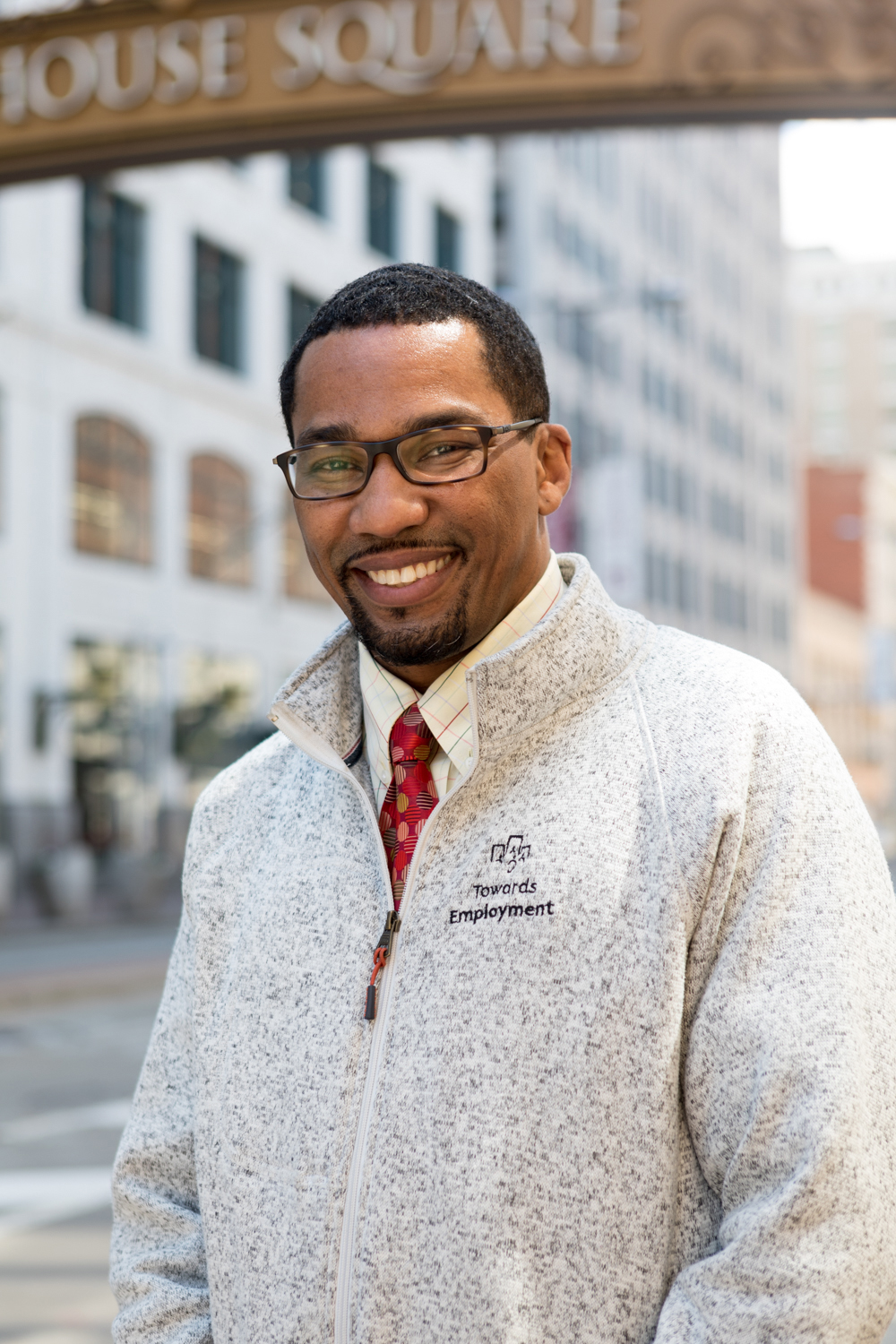For Returning Citizens, reentry programs in our community help answer questions at just the right time. With new connections, new resources and new options – organizations with reentry programs (like Towards Employment) leverage community funds and resources to answer questions, provide critical comprehensive services and cheer for every success. Join this effort.
Written by Ronnie Cannon, Community Engagement Manager, Towards Employment
Ronnie Cannon is the Community Engagement Manager at Towards Employment and manages all outreach efforts of the organization. In this blog, he writes generously from lived experience. This informs his work and leadership.

Each year thousands of men, women, and young adults return to Cuyahoga County after serving time in the state and federal prison system. Some come back into society with lofty goals and ambitions. Others return with little or no plan on how to succeed. In both cases, no one is planning to be part of an infamous recidivism statistic.
Although it might appear that the person with goals is ahead of the game, I believe they both are still at an equal disadvantage. This piece is not about the injustice a person faces after incarceration; it is about the importance of having reentry programming available in every community – and specifically our own - for those coming back after being in the prison system. I am one of those Clevelanders with the unique experience of returning to Cuyahoga County after serving a lengthy prison sentence. I now work for a Workforce Development agency that supports the reentry population; and can speak candidly on the impact of these programs for both the community and the reentering citizen.
Reentry programming often starts before a person is released back into society. While in prison, there can be an array of programming and services (mental health, anger management, time management, substance abuse, etc.). Some, but not all of these programs, are voluntary. Other inmates with prior knowledge about the subject matter often facilitate these programs. There is some thought that associating with other inmates may lead to varying degrees of prison assimilation – with both negative or positive impact. Being able to begin the process of thinking of life after prison can create loads of uncertainties: “where will I live; where can I find food; where can I get some clothing; how will I reconnect with my love ones; how do I navigate life with a criminal conviction?” These and so many more questions are jump-started as someone prepares to return to their community.
Answer the Questions. Having a program or programs to help people tackle these questions is vital – for the person and the greater community. I could overwhelm this blog with statistical data to support my argument, but I want to take a common sense approach. If fear guides a community’s response to returning citizens, it may be rooted in believing that individuals instinctively revert to what they know best. From experience, I believe whole-heartedly that people want to change – BUT they have to see that change is needed. It is extremely hard to move away from already established customs and patterns. Most people go back to the same place and space that they once resided. There are often many unresolved issues upon their return: lack of employment knowledge, domestic issues and trauma, access to illegal substances, and generational poverty. Reentry programs can change the pattern and cycle – and bring a new option into view. I know personally many times we don’t know we need help until after something bad occurs. When a person lives in poverty, they can be totally unaware of what is possible when everything around is cloaked in poverty.
When a person wants more - resources should be available. Being able to find and use a service like Towards Employment and the Cuyahoga County Fatherhood Initiative helped me to answer questions and build upon what I learned while in prison. These resources were beacons - providing a road map to help me and so many others navigate the challenges of life after prison. Resources, connective networks and career guidance are there for so many, should they not be available to returning citizens too; many of whom are struggling with the systemic injustice and inequity of the justice system and a history of redlined neighborhoods? These programs provide hope and prosperity for people who need it most.
Cheer! Finally, I feel as citizens we represent our community, our home, and should take an active approach in welcoming returning citizens. First – educate yourself on what challenges a person faces upon coming home – personal and systemic. Although returning citizens may not live next to you, they may often work with you or in places you find essential services – returning citizens are part of our community. Support organizations and efforts that help people see new and healthy options. Think of ways you can offer words of encouragement. For the vast majority of people returning from prison, confidence and self-assurance is a huge problem. Over a lifetime they hear comments like: “you can’t make it”, “you can’t do that”, or simply just “NO!!! To actually hear: “You got it!” or “You can make it!” or simply “we believe in you” goes a long way in supporting a returning citizen’s journey towards a new life.
If you’d like to get involved in reentry – donate, volunteer or be informed. Here are a few good places to start for state, national and personal information and connections:
- Cuyahoga County Office of Reentry - https://hhs.cuyahogacounty.us/divisions/detail/office-of-reentry
- Towards Employment: https://www.towardsemployment.org/
- The Marshal Project: https://www.themarshallproject.org/?ref=nav


